Previous National Cooperative Freight Research Program studies that provide context for Understanding New and Emerging Sources of Freight Data (NCFRP 49)
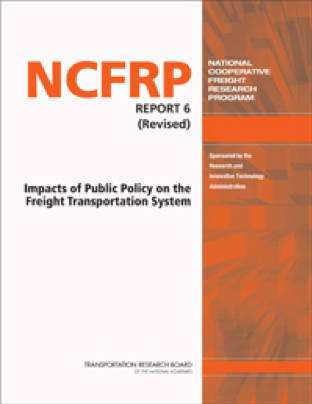
NCFRP Report 06: Impacts of Public Policy on the Freight Transportation System
Publication Date: 2010
Chapter 4 of this report discusses policies relevant to the freight challenges described in NCFRP 49, such as truck drivers’ hours of service, truck speed limits, and in-use truck emission standards.
This study uses administrative records to evaluate impacts of such policies and standards on private enterprises, and readers can identify implications for data collection and analysis, examples of which are provided in NCFRP 49.
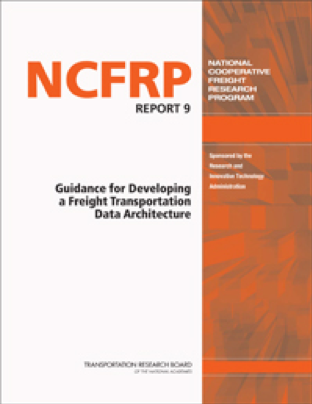
NCFRP Report 09: Guidance for Developing a Freight Transportation Data Architecture
Publication Date: 2010
This study was conducted to address the freight transportation sector’s need for reliable and timely data sources at different levels of spatial resolution and time scales, as well as a unified approach for data collection and/or acquisition. The resulting freight data architecture was intended to facilitate freight-related statistical and economic analyses, support the decision-making process of public and private stakeholders at the national, state, regional, and local levels, and enable the acquisition and maintenance of critical data.
This report describes a series of freight-related data sources together with their purpose, contents, arrangement, data integration issues and strategies to deal with them, and data adaptability.
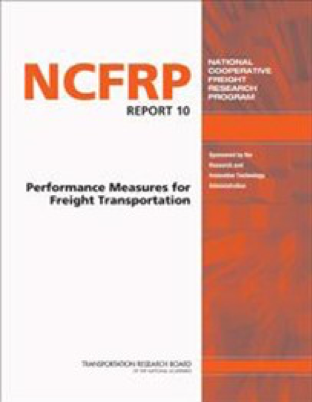
NCFRP Report 10: Performance Measures for Freight Transportation
Publication Date: 2010
The goal of this NCFRP report is to provide a framework for measuring freight system performance while maintaining the balance between depth and variety of measures, and minimal cost and complexity. The study summarizes practical methods to measure freight performance which can provide the reader with a background on freight analysis data needs.
Chapter 4 of this report provides a summary of the freight performance data available for different modes, and examples of freight data collection and applications that share some context with the NCFRP 49 study.
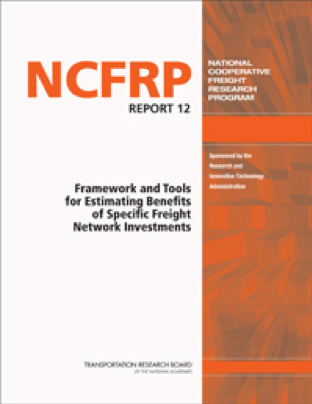
NCFRP Report 12: Framework and Tools for Estimating Benefits of Specific Freight Network Investments
Publication Date: 2011
This study provides information on analytical frameworks and tools that can be used to estimate the private and public benefits of potential freight infrastructure investments. A study of best practices, interviews with public and private freight stakeholders, and analysis of the data sources and methods used for freight system investment evaluations resulted in the development of a “Freight Evaluation Framework”.
This study shows that there are a wide range of data and tools currently used by different freight-related agencies, and there is a need for integration of these data and tools to ensure consistency in decision making among all freight stakeholders.
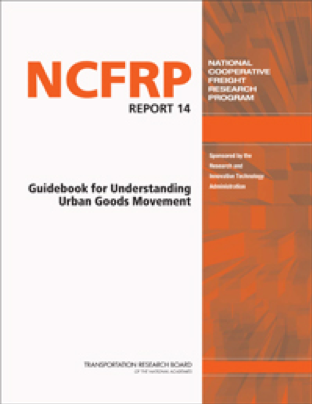
NCFRP Report 14: Guidebook for Understanding Urban Goods Movement
Publication Date: 2011
The report provides guidance on how to improve public decisions that affect truck movement for goods delivery in urban areas. In particular, it seeks to help decision makers understand the potential freight impacts of their decisions on topics such as transportation infrastructure and operations, land use, and regulations and ordinances applicable to urban areas. The research provides a protocol for data collection and analysis to measure freight performance and support public decision making. The benefits and barriers to the use of onboard GPS tracking, and other current information technologies accompanied by a study of best relevant practices are important aspects of this study.
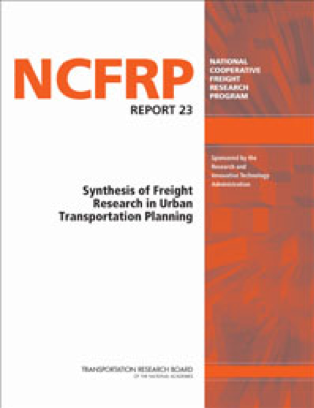
NCFRP Report 23: Synthesis of Freight Research in Urban Transportation Planning
Publication Date: 2011
This study provides a synthesis of international best practices for managing freight activity in metropolitan areas. The main focus of the report is to summarize the lessons learned with regards to the movement of trucks and management of goods delivery in metropolitan areas. A summary of the data trends and availability on truck traffic and its impacts on metropolitan areas is presented in this study. The study presents urban freight data issues and limitations to help readers understand challenges in addressing urban freight problems. The study also presents an overview of urban freight impacts on congestion, parking availability, mobility and reliability problems, and safety and environmental impacts.
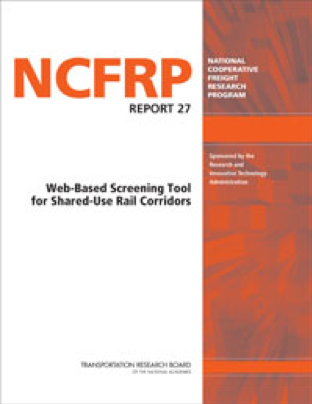
NCFRP Report 27: Web-Based Screening Tool for Shared-Use Rail Corridors
Publication Date: 2013
This report describes research conducted to develop a tool to perform preliminary feasibility screening of proposed shared-use passenger and freight rail corridor projects.
To provide a synthesis of the data requirements and address the gaps in current data sources, the study analyses the three main types of available data: (1) infrastructure data, (2) traffic data, and (3) cost information. The report suggests a wide range of administrative records to be used as data sources and presents relevant case studies to help decision makers.
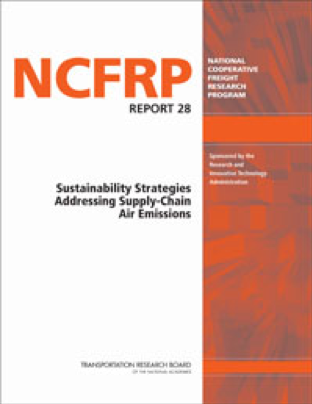
NCFRP Report 28: Truck Idling Scoping Study
Publication Date: 2012
This study provides a plan to inform decision makers about the scope of methods and costs of obtaining national and regional data on truck idling. Idling data can help shape national, regional, and local policies to address issues related to fuel consumption, and emissions. These issues are dependent on factors such as truck engine technology, freight operations, vehicle location, truck driver well-being, and safety.
Advances in truck GPS data collection methods have the potential to better characterize the variability of these contributing factors in truck idling activity. This NCFRP report provides detailed information on truck idling data collection and implementation.
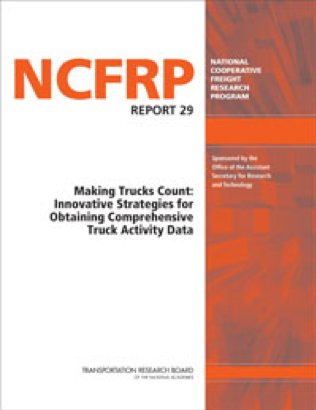
NCFRP Report 29: Making Trucks Count: Innovative Strategies for Obtaining Comprehensive Truck Activity Data
Publication Date: 2014
This study discusses three data acquisition methods as potential aids in policymaking: truck GPS tracking; vehicle inventory and use surveys; and agent-based freight models.
This study assesses freight planning needs, and issues related to gathering data. The report also provides users with methods to compensate for possible gaps in visibility in freight data. Information on freight data implementation, data generation, maintenance, and metadata accompanies this report.
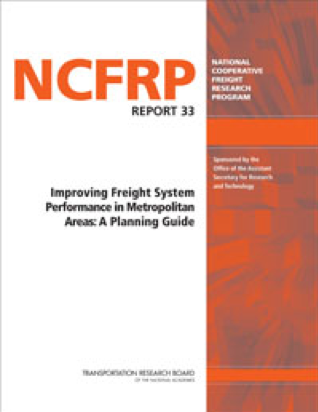
NCFRP Report 33: Improving Freight System Performance in Metropolitan Areas: A Planning Guide
Publication Date: 2014
This study provides guidelines for metropolitan freight planning by identifying strategies and practical solutions for public and private stakeholders to improve freight mobility and performance in urban areas.
Nine case studies from different cities across the U.S. accompany this report to provide context and support guidelines for the implementation of freight initiatives in metropolitan areas. These case studies can provide a valuable reference for types of data used (such as ATRI truck GPS data) and methodologies to plan long-term regional freight-related developments.
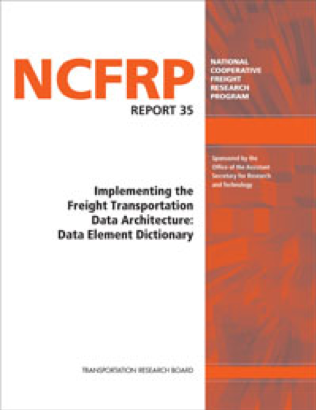
NCFRP Report 35: Implementing the Freight Transportation Data Architecture: Data Element Dictionary
Publication Date: 2015
This report discusses the findings from design of a web-based tool that serves as a freight data dictionary for transportation analysis. The freight data dictionary also provides recommendations for identifying differences in data terms and definitions, and methodologies for resolving these differences.
The inventory of freight data sources that accompanies this report can provide readers with the context in which freight data is collected and used. Additionally, references to user manuals and data support information are also provided to guide users through steps of data collection and application.